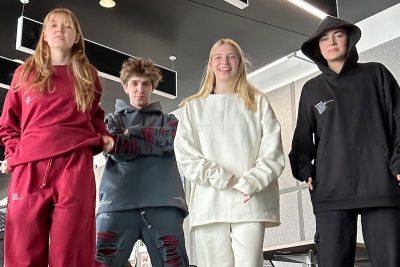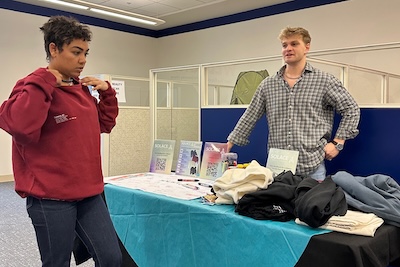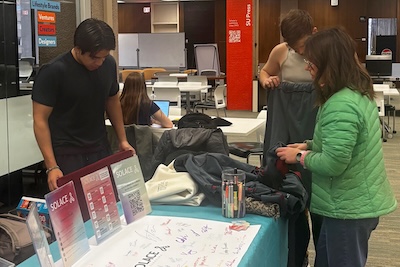Carolyn Fernandes ’25 remembers walking out of an interview for a design internship that she ended up not getting. She wondered if fidgeting with her nails—a common, repetitive expression of her nervous energy every day—was misconstrued as a sign of not paying attention and a reason for her not getting the position.

Fernandes is part of the 20% of people worldwide who are neurodivergent and live with neurological differences like autism, attention-deficit hyperactivity disorder (ADHD), dyslexia, bipolar disorder and social anxiety.
Stories like the one above motivated Fernandes and fellow students Lucas d’Oelsnitz ’25, Aphrodite Gioulekas ’25 and Aidan Turner ’25 to create SOLACE Collective, which aims to provide everyone, especially neurodivergent individuals, with comfortable garments that alleviate anxiety, increase confidence and reduce distractions by providing opportunities for fidgeting discreetly or openly.
“People like me need to fidget to cope and feel comfortable, so I started researching ways clothing could be made to help neurodiverse people like myself feel more comfortable,” Fernandes says.
After an inspiring conversation with Linda Dickerson Hartsock—the retired founder and executive director of Blackstone LaunchPad at Syracuse University Libraries—and after taking a College of Visual and Performing Arts/School of Education Intelligence++ class focused on inclusive product design, Turner came up with the idea for SOLACE “to meet the needs of a huge portion of the population that is currently underserved,” says Turner.
Going All-In
“Realizing this is something I would wear motivated me to go all-in on this project because this is not just a clothing brand; it’s solving an important social issue.”
Lucas d’Oelsnitz ’25
In October, Turner set about assembling what he proudly refers to as his team of Avengers to turn concept into reality. As part of the group, Turner, a fifth-year architecture student in the School of Architecture, recruited Fernandes, who is studying industrial design in the College of Visual and Performing Arts (VPA) and Spanish and environmental geoscience in the College of Arts and Sciences; d’Oelsnitz, who is studying finance and entrepreneurship in the Martin J. Whitman School of Management; Gioulekas, a fashion design major in VPA; Maria-Camila Molina ’25, a fashion design major in VPA; Christine Ianniello ’25, a biology major in Arts and Sciences; Bobby Anzaldua ’25, an economics major in the Maxwell School of Citizenship and Public Affairs; Bella Tabak ’25, a magazine, news and digital journalism in the S.I. Newhouse School of Public Communications; and Francine Tongol ’24, a communications design major in VPA.
After sharing their personal experiences with uncomfortable clothing with each other, Turner pitched creating the neurodivergent clothing line. The project’s potential impact immediately resonated with d’Oelsnitz. At Whitman, d’Oelsnitz does a lot of idea pitching but always struggles to control his fidgeting. After one of his first pitches before his peers, d’Oelsnitz nearly passed out because, unable to rely on his usual coping mechanisms like playing with his rings, he felt anxious and light-headed.
“Realizing this is something I would wear motivated me to go all-in on this project because this is not just a clothing brand; it’s solving an important social issue,” says d’Oelsnitz, who has ADHD and bouts of anxiety.
Unique Needs

The team set out to collect data on how SOLACE could better meet the needs of neurodiverse individuals, beginning with a wardrobe analysis and personal interviews to determine what types of clothing neurodivergent people liked or didn’t like—including textures and how a garment feels.
For the next step, Fernandes conducted a survey of 430 people ages 5 to 91 and discovered that 95% of respondents, including 97% of neurodiverse people, experienced discomfort from their clothing.
Incorporating the feedback and relying on sketches, Turner created a visual design brief that served as the blueprint for the first line of clothing, and Fernandes and others on the team used sewing machines to create prototypes from fabric samples collected from their closets and local thrift shops.
Currently there are four prototypes consisting of a matching sweatshirt or hoodie and sweatpants of assorted colors, fabrics and designs:
- Concealed fidgeting: A sweatsuit featuring textured cargo pockets with hidden interior fabrics for discreet sensory engagement
- Participatory fidgeting A distressed, double-layered top and bottom set with tactile cutouts for visible fidgeting—turning a need into a confident form of self-expression
- Airy and light: A minimal-stitched, ultra-breathable sweat set built for those sensitive to seams and pressure, offering a loose and calming fit
- Clasp cuffs A crewneck set with subtly exposed, adjustable elastic cuffs that let wearers control tightness for customized comfort
The clothes are tagless (product details and cleaning instructions are screen-printed on the outside), with many of the items providing its wearer a sense of grounded-ness thanks to the use of heavy fabric, while others rely on light and airy fabrics.
“Our product line serves to confirm to a lot of neurodivergent people that what they’re doing is okay and that they can be normal,” says Fernandes, who serves as SOLACE’s industrial designer. “And it’s not just neurodivergent people that want this clothing. If everyone is wearing it, then no one is going to feel like they’re sticking out like a sore thumb while they fidget.”
Transforming Vision

“We try to achieve a grounded feeling while providing warmth and the reassurance that you’re safe. We’re trying to find a sustainable way to produce items of clothing for everyone, no matter how your neurodiversity presents,” says d’Oelsnitz, SOLACE’s project coordinator.
The group has received more than $32,000 in startup investment money through entrepreneurial competitions held on campus and through grants, including the 2025 School of Information Studies’ Raymond von Dran Fund for Student Entrepreneurship iPrize competition. Earlier this semester, they held 10 events on campus for students to try on the clothes and provide feedback.
After running a marketing campaign, including the launch of a website and social media channels, they hope to start accepting pre-orders in late June, with items being distributed to customers by the end of the summer. Knowing how well-received their casual prototypes have been, Turner, Fernandes and d’Oelsnitz next want to expand into business casual clothing.
“I have a passion for designing fashion, for retail and for entrepreneurship, and I was introduced to the lack of solutions that exist for neurodivergent individuals,” says Turner, SOLACE’s team coordinator. “There are a lot of opportunities for us to give this overlooked community reassurance and warmth through our clothing, and I’m proud of what this wonderful team has accomplished so far.”
